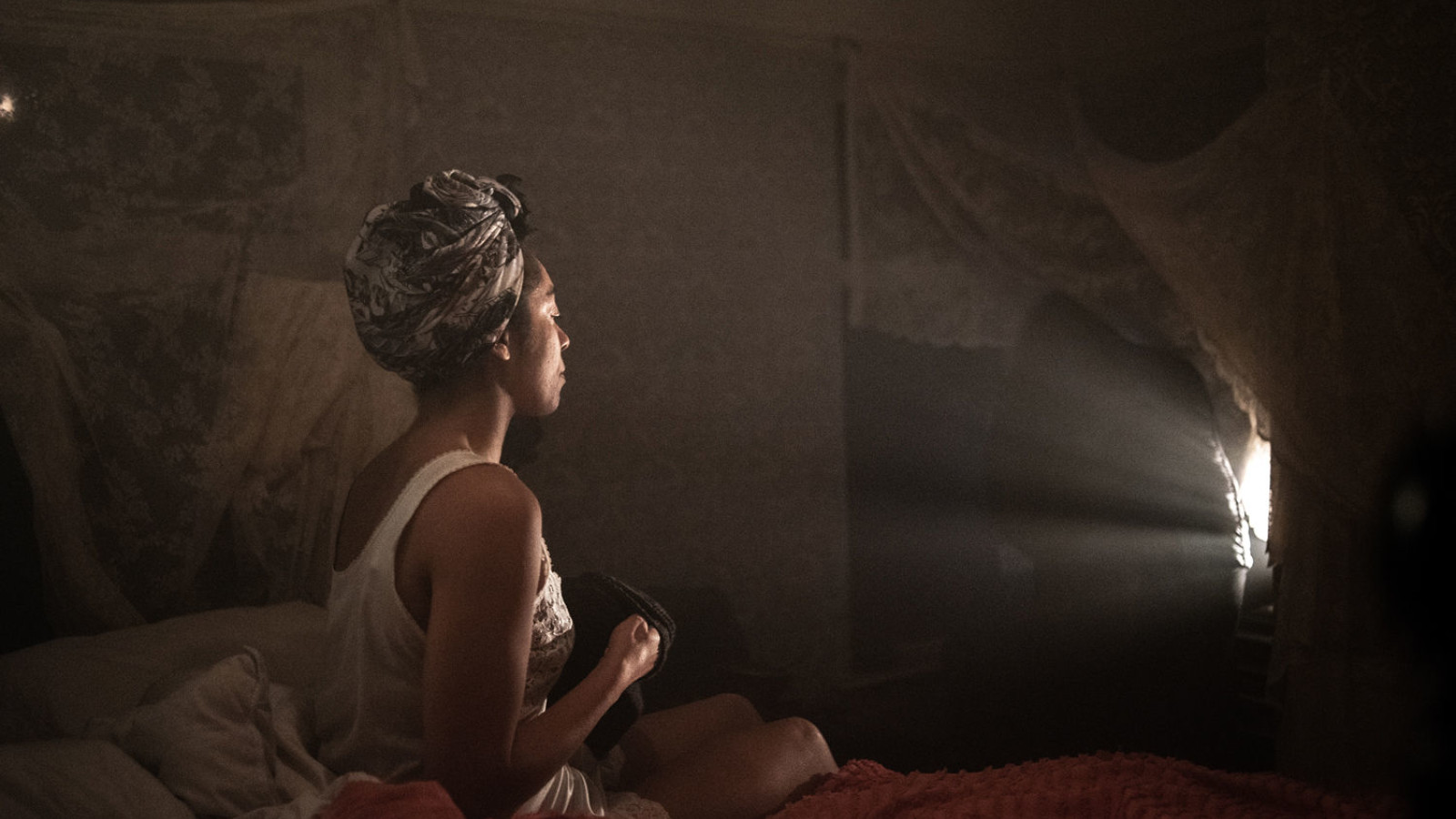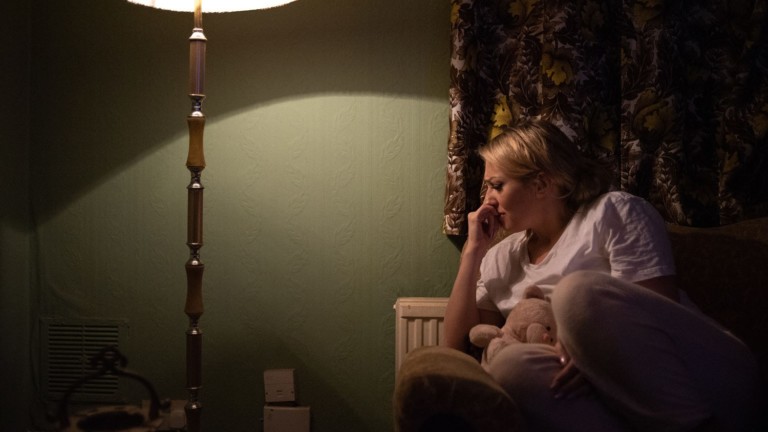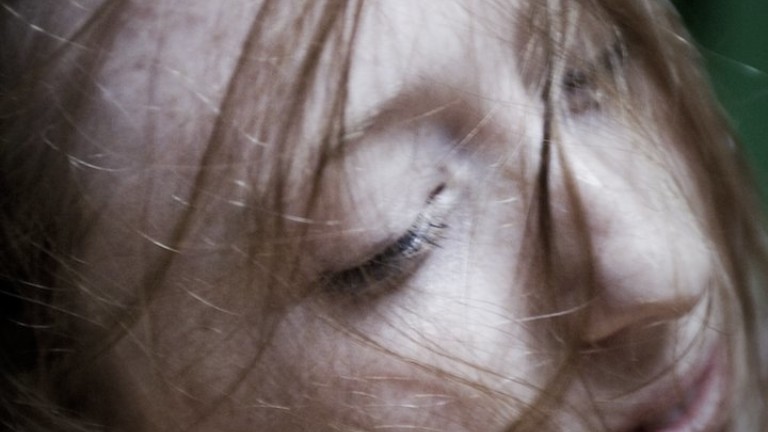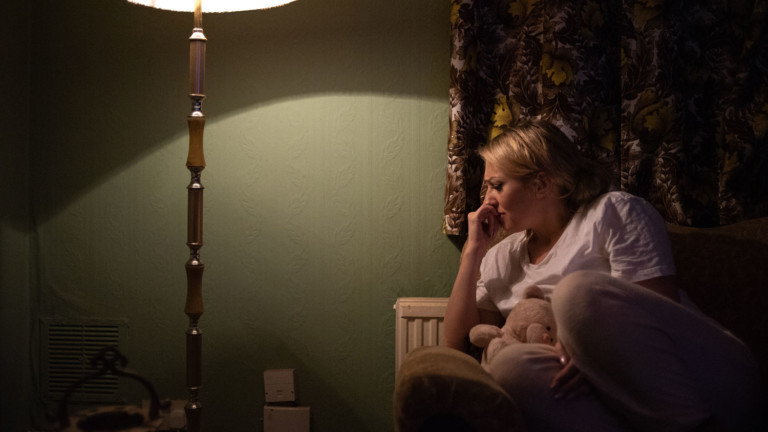I am standing in St Helens Central Railway station. Having survived what feels like an endless saga of delayed and cancelled trains, I am pleased to see I have arrived in time.
by Chrissie Tiller
Created by ANU and the women of St Helens, the site-responsive production wound its way through the town from St Helens Central train station, to a house on Charles Street and then back to the Hippodrome bingo hall. Creative consultant, practitioner and critical friend of Heart of Glass Chrissie Tiller reflects on her individual TORCH experience.
I am standing in St Helens Central Railway station. Having survived what feels like an endless saga of delayed and cancelled trains, I am pleased to see I have arrived in time. Enough time to find my way to the ‘Mexican café’ a man outside the pub is determined to convince me doesn’t exist. Enough time to have a hot chocolate before I go out into the ‘weather’. Enough time to distance myself from London: to land in this town whose history, stories and social and economic realities have somehow woven their way into the fabric of my life over the past three years.
I am standing in St Helens Central Railway station. A young woman I recognise, wearing a Heart of Glass vest, hugs me, checks my name off on a list and asks me to write down my name, gender and age. I feel strangely ambivalent about sharing the latter, realising it has become something increasingly difficult to own up to; especially as a woman. And yet, as I begin to write about this piece, I recognise, that, like my gender and my class, my age threads its way through every moment of my response to this performance. By the end of the evening, I feel I should have shouted it out: claiming a history that is my history, declaring my personal connection with these women and owning so many of these stories.
I am standing in St Helens Central Railway Station. Chatting with another audience member about the growing impact of austerity, the rising inequalities of world we live in. A young woman approaches us. Somewhere on the periphery of my vision, I have noticed her struggling with the drinks machine. She looks anxious. Out of time and out of place. She asks us if we have any spare change. Having handed in my bag to the stewards, I don’t have a wallet. I don’t have any money in my pockets. And, although I know we are waiting for a performance, and I’ve already distinguished potential audience members and performers from those people who are clearly ‘just waiting for trains’, the young woman’s distress is palpable. I am relieved when the person I am with finds some coins. My sense of guilt and embarrassment already hinting at an unsettling blurring of the boundaries between theatre and reality. Giving up on the machine, the young woman returns the coins and runs off in the direction of the road. TORCH has begun.
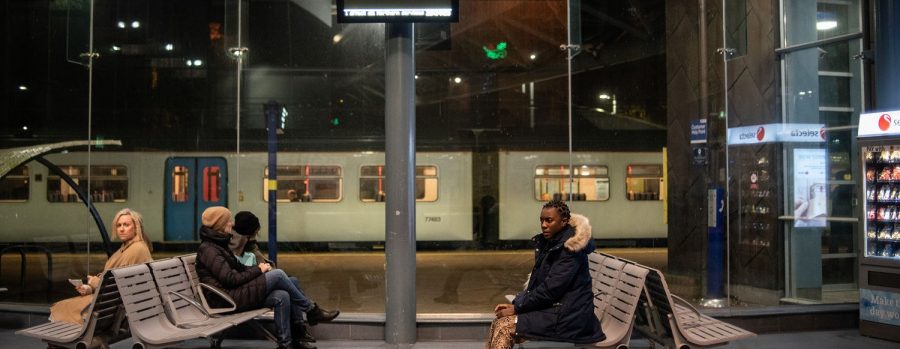
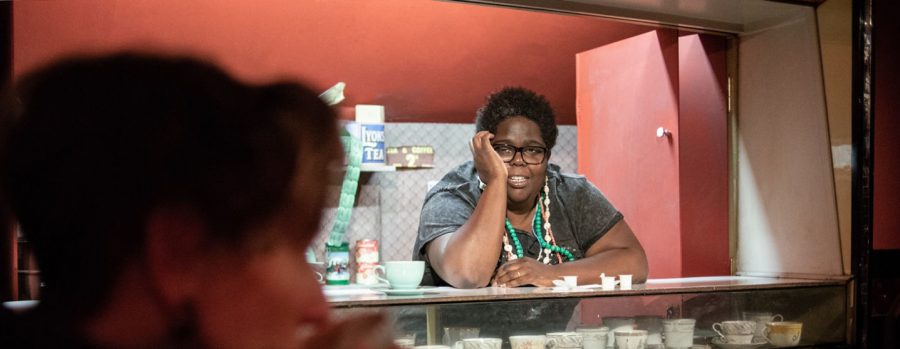
My sense of guilt and embarrassment already hinting at an unsettling blurring of the boundaries between theatre and reality.
A second woman grabs hold of us. Out of breath and stressed, she is anxiously seeking the woman we have watched leave the station. We have already told her which way she has gone before she shows us an identity card. Still caught between the world of St Helens and the world of the play I wonder if I’ve done the wrong thing? What if this woman had been working for the Immigration authorities, for the police? What if the young woman running away had had good reasons for not wanting to be found? But, instantaneously caught up in the conventions of the piece, my companion and I find ourselves running with this second woman to her car, promising to help her look for the girl on our way to ‘the house’. We sit beside and behind her. We look out of the window, as if we really hoped we might spot the girl we now know to be vulnerable and in need of support. She hands one of us her phone, chats with her ‘sister’ on speaker about getting her daughter ready for the school nativity play, about the effort she has put into the slightly disastrous gluten free gingerbread men. We have become her confidantes, complicit in her deceit when she discovers the ‘halo’ she has insisted is in the house, is in fact, on the floor of the car. Audience as witness to this woman’s world. A world of overworked and underfunded care services. A world where a mother can’t be there for her daughter’s big event. We are caught up in her sense of responsibility, the guilt she tries to push aside, her reluctant acceptance that she will never manage to be everything for everyone.
And then we are in the ‘safe’ house. Finding the fuse box, she puts on the lights, sits us down and leaves as quickly as she has come into our lives. But before we have chance to be in this space, a third woman grabs my hand, leads me up a narrow staircase, opens a door and we are in her bedroom. Time has shifted for the two of us. She invites me to sit on the bed in this topsy-turvy, cluttered 1940s room and begins to speak. I find difficult to listen. My eyes blur. I begin wrapping my arms tightly round myself. Because something else has changed apart from the time. This piece of theatre, taking place before only my eyes, is, ‘my story’. Not in the sense this woman is me. But in the sense that she is telling me the story that has made me who I am. The story of an ordinary, working class girl who became herself, who grew into who she really was and, despite all that was wrong about it, had the ‘time of her life’ in the Second World War.
I find difficult to listen. My eyes blur. I begin wrapping my arms tightly round myself. Because something else has changed apart from the time. This piece of theatre, taking place before only my eyes, is, ‘my story’.
My Mum didn’t live in St Helens. She didn’t become one of the Idle Women, working the barges while the men were away, whose stories Etta Fusi shares. But, as a young woman of 22, she did leave the tenement block she still lived in with her parents, gave up her tailoring job in Burtons and joined the Land Army. She discovered, like many of those who took on men’s roles at this time, that she loved being outside. Like Fusi’s character, she loved the sheer physicality of working the fields, the blissful sense of exhaustion she felt at the end of a day. She loved being taught to drive and put in charge of delivering Italian and German prisoners of war to farms up and down West Yorkshire. She loved being asked to run a hostel of women: women who had been teachers, civil servants, even a debutante (who she told me proudly didn’t ‘last very long’). And, like the young woman whose story being shared with me in the privacy of ‘her bedroom’, she spoke about this time with a joy and sense of purpose that we rarely heard later as she brought us up on a council estate in Leeds.
But this is not a piece that lets me dwell in the past. In one of the shifting maelstroms from ‘then’ to ‘now’ to ‘another then’ that are part of TORCH, I am downstairs again; sitting and looking at a room that has once more shifted in time. It is a room I both know and don’t know. I know the mirror on the wall, the standard lamp, the electric fire in the fireplace. I know the kitchen doorway, the sounds, the smells and the stories that hang in the visceral spaces between them. And I knew a woman, who wasn’t Sarah Morris, curled up like a baby on the sofa, telling us of her struggle to get back her children. But I did know Mrs Trigg. A young mother who lived next-door spent most of her time wrapped up in a pink dressing gown like this pink dressing gown. A young mother who couldn’t cope, and who in her desperation, began to think she had to stay inside because people were talking to her through the television. A young mother who nearly had her sons taken away from her because one day she fell asleep on the sofa, let a cigarette end drop, and almost burnt her house down; taking ours with it.
I knew my aunts and cousins’ houses and flats by the canal on East Street. I knew Mrs Farden, who came from Kippax, whose ‘bad boy’, son I beat up on the grass verge in front of our house because he tried to steal my bike. I knew women who lived through hard times but somehow stuck together and became the glue for each other’s splintered lives. I knew the women who were sharing their stories with me in this room, and even if there was a blurring of times and places it didn’t matter. Because the skin of this house held all of them.
I knew women who lived through hard times but somehow stuck together and became the glue for each other’s splintered lives. I knew the women who were sharing their stories with me in this room, and even if there was a blurring of times and places it didn’t matter. Because the skin of this house held all of them."
And even though I was already in London, standing outside the local Co-op collecting food and funds at the time of the Miners’ Strike, I felt I knew this woman from St Helens who now stood on the table speaking with such passion women taking on the struggle. Women who saw it as a way of finding themselves and their strength and their vitality and their anger at the injustices of this world. And, because I knew, from other times, of how a mother might feel spending all day in a Social Security office or waiting for handouts from the St Vincent de Paul to buy Christmas presents for her kids, I also understood her daughter’s arguments about needing to get your men back to work. I felt the pride of those women for whom the Strike, like the War, offered a sense of solidarity and empowerment. And I felt the hurt and pain of those who had had ‘Scab’ written over their doors because they had caved in at the end. Because the poor are always set against the poorest. Especially when Capitalism feels under threat.
And, even though one part of me watched these women with the distance that being part of an audience creates, I wanted to take all these women in my arms and hold them.
Standing in the kitchen with Gillian McCarthy later, watching the 1984 Queen’s Speech together on a black and white television, listening to her speak about the way her and her daughter, Niamh McCann, had been torn apart by the cruel aftermath of that strike I wanted to shake them both and take the Poundland Barbies she had bought for her grand-daughters and put them in their hands so they, and their Mum, would know how much she missed and cared for them.
But instead we watched in silence. None of us spoke about the incongruity of Diana wearing a flying saucer of a hat while she nursed her baby or Charles’ brusque direction to her to wipe off the puke. Or the parallels and intersections between the life of this young woman abused by a whole family and the stories of the women in this house reverberated in the space between us. But they continued to reverberate as this house began to pulsate with sound and we watched Nandi Bhebhe’s fierce, unflinching retelling through dance of the young woman who had finally found her way to the refuge. We were filled with the rawness of her pain, but we also sensed her inability to stop and rest, her need to be somewhere other than this suffocating, pain-filled house, and when McCann despairingly accused us of letting her go, reneging on our promise to take care, we sensed it had somehow been the right thing.
Then just as quickly we are back in the 1940s, running with Etta Fusi down a street at night where bombs had fallen, finding ourselves in a disturbing intersection between ‘now’ and ‘then,’ between St Helens the place and St Helens the women’s story, as we manoeuvred our way through a group of teenage boys, faces masked, who had strung themselves across the road in front of us. My mind kept swinging between a 1940’s image of my Mum and her sisters’ arms linked in this way as they ran along the front at Blackpool and an article I had read on the train about the growing violence and the escalating suicide rates of young men in St Helens. ‘Now’ and ‘then’ kept shifting and colliding as we sat in the 1940s cinema refreshment bar in the Hippodrome Bingo Hall drinking tea and listening to Sonia Hughes’ own story. Never quite clear whether her Greek friend, Theo, is real or not. Whether she can really read our future in our tea leaves. Responding to her questions about ‘truth’ and things we’ve regretted we never did. Stunned into deep and self-reflective silence by the question she leaves us with: ‘What would you do if you weren’t afraid’.
Like characters in a fairy tale, we stay with that silence, until we finally sense the spell has broken, and the four of us who have made up the audience for the past 75 minutes, begin to speak: in awkward and slightly hushed voices. Because TORCH does literally take your breath. It takes time to emerge from the world it has created. A world that is your own but not your own. A world that is a constant whirlwind of ‘then’ and ‘now’ and ‘then’, but which finally places us firmly in the ‘now’ that is St Helens, with the voice of a local MP speaking in Parliament about the cruel effects of austerity policy and the number of children living in poverty and in need of care.
TORCH is the recreation of stories gathered from the women of St Helens over two years: of voices that are often unheard. But it is also, as Director Louise Lowe reminds us in the discussion later, a re-telling of the story of another Helen: a woman of beauty whose mythological story of being raped, torn from her children and taken by force to a foreign land has been mediated and handed down to us by men. If TORCH does constantly remind us of these themes and realities in the lives of the women of St Helens, it also reclaims the stories of women who have fought against adversity by finding solidarity, women who work tirelessly to create spaces and places of refuge, women whose lives are lived out, un-noticed and un-recorded, in cities and towns across the UK. It honours these lives in the meticulous recreation of time and place formed and shaped by set and costume designers Maree Kearns and Niamh Lunny. It honours them through Sinead Diskin’s sound design that subtly shifts our sense of place and time: continually reminding us of our role as listeners as well as watchers in this immersive experience.
If TORCH does constantly remind us of these themes and realities in the lives of the women of St Helens, it also reclaims the stories of women who have fought against adversity by finding solidarity, women who work tirelessly to create spaces and places of refuge, women whose lives are lived out, un-noticed and un-recorded, in cities and towns across the UK.
In the discussion afterwards, Lowe speaks about the spirit of inquiry that has united performers, creators, producers and designers in this piece. She speaks about the almost athletic training involved in performing a piece that constantly needs to engage with the realities of the town as well as the constructed world of the house. She and producer Lynette Moran tell us about the different journeys they went on while shaping what has become the final piece we see. A piece crafted to ensure each member of the audience experiences differently. As part of that process Lowe mentions an idea she had, about collecting a hundred gestures. Gestures that reminded each of the women they spoke to of their own mothers. She raises her hand in a gentle motion. And I think about my mother, enclosed in some world of her own at the end, running her hands across her skirt, smoothing and smoothing the material, just like the young tailoress she had once been: sitting at a sewing machine, creating a sense of order and neatness in a world that was just about to explode into chaos and turmoil.
At a time when it sometimes feels like the world is about to spiral into another dark space, a time when our country is increasingly divided, across class, across gender, across race, across economic and social boundaries it seems to me that we desperately need to hear the voices and understand the lives that TORCH presents to us. We need to find solidarity with those who matter and those who work for social and economic justice and change. We need to create theatre that is relevant, radical, political - and rooted in the experience of (extra)ordinary working class people who rarely see their lives on stage.
Like the women of St Helens. TORCH made me realise why I love theatre but also why, as someone who has been a theatre-maker in the past, I have stopped going. I want to feel like I did when I got back on my train to London, that I want to go again. That I need to go again. That theatre matters.
Photo credits: Radka Dolinska
